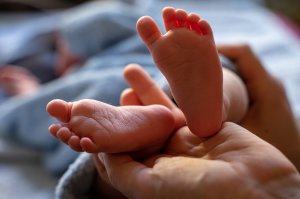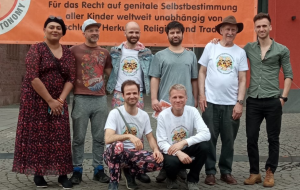We are committed to ending all forms of forced non-therapeutic genital cutting.
This includes female genital mutilation (FGM) and ritual circumcision of boys.
A child's right to bodily autonomy must not be overridden by other people's religious or cultural beliefs.
The National Secular Society supports a person's most fundamental right to grow up with an intact body and to make their own choices about permanent bodily modifications.
All forms of forced cutting on children's genitals breach basic child rights and safeguarding guidance.
Several communities have genital cutting traditions, often rooted in religious beliefs. But children, and particularly babies and young infants, are incapable of giving consent to such medically unnecessary, harmful, painful and permanent procedures.
Sometimes health benefits for non-therapeutic genital cutting are claimed despite the evidence to the contrary. All forms of forced genital cutting risk serious emotional, sexual, and physical harm – including death.
Child safeguarding must always be prioritised above the desire of adults to express their belief through forced cutting of children's genitals.
Female genital mutilation (FGM)
"It is irrelevant whether or not a person believed the operation to be necessary in the child's best interests as a matter of custom or ritual."
We are committed to the eradication of forced genital cutting of girls and women known as Female Genital Mutilation (FGM) in all its forms.
There are thought to be well over 100,000 women and girls affected by FGM living in the UK. We work with like-minded organisations to protect girls from the harm of forced genital cutting.
FGM practices vary. Some forms involve a pinprick or the removal of a small amount of tissue from the clitoris. Other forms include complete removal of the clitoris and labia, and stitching the vulva closed. Communities which practice FGM often cite religion as a motivation.
All forms of FGM are child abuse and are rightly illegal in the UK. But some British girls are still unprotected. Some have been sent abroad to undergo the procedure and others are having it performed secretly in this country.
There has been only one successful prosecution for FGM since it was banned in 1985. We are concerned that fear of upsetting cultural and religious sensitivities is preventing authorities from tackling FGM effectively.
"...a right specifically for African families who want to carry on their tradition whilst living in this country"
As with all forms of forced genital cutting, those who speak out against FGM are often accused of disrespecting their parents or cultural heritage, and of over-dramatising a 'minor' procedure that others 'don't complain about'. Together with the perceived humiliation of speaking about one's own genitals, these factors combine to ensure that many sufferers are reluctant to speak out.
Ending FGM requires sustained civil society action to change attitudes and inform girls of their rights.
Male circumcision
While all forms of FGM are rightfully banned, non-therapeutic circumcision of boys is permitted in UK law.
The foreskin is a normal body part with physical, sexual and immunological functions. Removing it from non-consenting children has been associated with various physical and psychological difficulties. These are likely to be greatly under-reported because people who have experienced sexual harm are often reluctant to reveal it as societal dismissal or stigmatisation may compound the harm.
Circumcision is excruciatingly painful. When performed on babies, little to no anaesthesia is used. Even when performed under anaesthesia on older children, the recovery entails weeks of pain and discomfort.
The procedure is also dangerous. Between 1988 and 2014, there were 22,000 harms recorded by the NHS resulting circumcision. They included scarring and full penis amputation. In 2011, nearly a dozen infant boys were treated for life-threatening haemorrhage, shock or sepsis as a result of non-therapeutic circumcision at a single children's hospital in Birmingham. In 2007, a newborn baby went into cardiac arrest minutes after he was circumcised in a London synagogue, and subsequently died.
Any claims of marginal health benefits of circumcision are extremely contested. No national medical, paediatric, surgical or urological society recommends routine circumcision of all boys as a health intervention. There is now growing concern among doctors that existing ethical principles of non-therapeutic childhood surgery should no longer include an exception for non-therapeutic circumcision.
62% of Brits would support a law prohibiting the circumcision of children for non-medical reasons. Only 13% would oppose it.
There is very limited regulation of non-therapeutic circumcision in the UK. We do not know how many such procedures are performed annually or the degree of harm, as there is no requirement for any follow up or audit and the boys themselves are too young to complain.
It is now being recognised more widely that non-therapeutic religious and cultural circumcision is a breach of children's rights. We want to see the same protections for girls' bodily autonomy extended to boys.
Take action!
1. Write to your MP
Ask your MP to support an end to non-consensual religious genital cutting
2. Share your story
Tell us why you support this campaign, and how you are personally affected by the issue. You can also let us know if you would like assistance with a particular issue.
3. Join the National Secular Society
Become a member of the National Secular Society today! Together, we can separate religion and state for greater freedom and fairness.
Latest updates
NSS defend mayor ousted for questioning religious circumcision
Posted: Thu, 15 Jun 2023 11:19
The National Secular Society has teamed up with a men's health charity to raise concerns after a mayor was ousted for criticising religious circumcision.
In a 2008 blog, former mayor of Neyland town council Andrew Lye questioned why religious circumcision of children was necessary if God "made man in his own image".
At a meeting earlier this month, fellow councillor Brian Rothero said the remarks were "nothing short of antisemitic and anti-Muslim". The council subsequently voted to remove Lye from the mayoralty and Lye has now resigned from the council.
In a joint letter sent to Neyland town council yesterday, the NSS and 15 Square criticised the allegations against Lye as "baseless" and said they would have a chilling effect on free expression.
15 Square is a registered charity which supports men dealing with the physical and psychological problems arising from circumcision.
"In a free and open society, religious beliefs and practices must remain open to scrutiny and debate. Individuals should be afforded respect and protection, but ideas should not", the letter said.
The letter also pointed out that circumcision has been listed as a "harmful" practice by the United Nations. In 2015 a British judge described it as "more invasive" than some forms of female genital mutilation and held that it met the definition of "significant harm" under the Children Act 1989.
Three boys have bled to death in recent years post-circumcision in the UK (Celian Noumbiwe, Angelo Ofori-Mintah, and Goodluck Caubergs) and 11 were admitted in just one year to just one hospital with life-threatening haemorrhage or sepsis. An NHS whistleblower, himself a paediatric surgeon, said in 2016 circumcisions were leaving children "maimed for life".
A Freedom of Information Request to the General Medical Council last year revealed complications of circumcision recorded between 2012 and 2022 included penile deformity, infection, urinary complications and inadequate anaesthesia. Babies required blood transfusions in some cases.
A 2018 YouGov poll showed 62% of the British public would support a law against non-medical circumcision of boys.
NSS: "Andrew Lye spoke up in defence of the bodily integrity and autonomy of children"
NSS campaigns officer Dr Alejandro Sanchez said: "In 2016, the UN Committee on the Rights of the Child urged the government to ensure 'no one is subjected to unnecessary medical or surgical treatment during infancy or childhood'.
"Religious infant circumcision is exactly that: unnecessary, painful and risky surgery on non-consenting children to satisfy religious or cultural beliefs of their parents. Allegations of antisemitism or Islamophobia cannot be allowed to silence legitimate criticism of harmful religious practices.
"Andrew Lye has been ousted from the mayoralty because he spoke up in defence of the bodily integrity and autonomy of children. This will now have a chilling effect on anyone in politics wanting to speak out for children's fundamental rights."
Image by Thorsten Frenzel from Pixabay
NSS speaks out at pro-genital autonomy event
Posted: Wed, 10 May 2023 11:48
The National Secular Society has called for an end to all forms of non-consensual religious genital cutting at the Worldwide Day of Genital Autonomy.
In a speech on Sunday, NSS campaigns officer Dr Alejandro Sanchez urged the government to "ensure that no one is subjected to unnecessary medical or surgical treatment during childhood", as recommended by the UN Committee on the Rights of the Child.
The "bodily integrity, autonomy and self-determination" of children must be protected, he added.
The Worldwide Day of Genital Autonomy (WWDOGA) is held in Cologne each year to commemorate the verdict of a local court in 2012, which held that non-therapeutic circumcision of boys constituted grievous bodily harm and was illegal under German law.
The court ruled that the "fundamental right of the child to bodily integrity outweighed the fundamental rights of the parents". Waiting until the child was capable of making their own decision about circumcision did not compromise the religious freedom of parents, it added.
Then-chancellor Angela Merkel said the decision to protect the bodily integrity of children risked Germany becoming "a laughing stock". The German parliament subsequently brought in new legislation to legalise circumcision.
Other groups represented at this year's WWDOGA included Terre de Femmes, an anti female genital mutilation organisation, and 15 Square, a support group for men affected by circumcision.
Religious genital cutting in the UK
Female genital mutilation (FGM) is illegal in the United Kingdom under the FGM Act 2003. This includes FGM performed for religious reasons. Non-therapeutic circumcision, by contrast, continues to enjoy a presumed exemption to the law against wounding.
Three baby boys, Celian Noumbiwe, Angelo Ofori-Mintah, and Goodluck Caubergs, have bled to death post-circumcision in recent years. Eleven were admitted to Birmingham Children's Hospital in just one year with life threatening haemorrhage, shock or sepsis following circumcision.
An NSS investigation last year revealed circumcisions were leaving children with deformed penises and babies requiring emergency blood transfusions.
In 2015, an English judge held that male circumcision is "more invasive" than some forms of FGM. The practice constituted "significant harm" under the Children Act 1989, he said. But, because it had a "basis in religion" and "health benefits", it fell within "reasonable parenting".
The NHS does not recommend non-therapeutic circumcision of boys and lists "permanent reduction in sensation in the head of the penis, particularly during sex" as a complication.
NSS: 'Religious genital cutting flies in the face of medical ethics and child rights'
Dr Sanchez said: "Subjecting a non-consenting child to a painful, dangerous and irreversible procedure to satisfy the religious wishes of parents flies in the face of medical ethics and child rights.
"The medical establishment and the government must now act, as they have done with FGM, to protect boys from medically unnecessary religious and cultural genital cutting."




